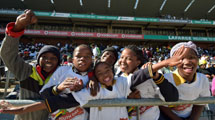By Minister Nathi Mthethwa
 In his historical novel To Every Birth its Blood, that examines the turbulent period of the late 1970s, Mongane Wally Serote, captures the spirit of the times and gives voice to the intellectual underpinnings and contribution of a generation, when he writes that: “Like an old tree, the Movement spreads and spreads its roots….The tall tree, spreading its branches all around, gives shade to the weary. The Movement is an idea in the mind of the people: a resolve that it will never accept the process of defeat.”
In his historical novel To Every Birth its Blood, that examines the turbulent period of the late 1970s, Mongane Wally Serote, captures the spirit of the times and gives voice to the intellectual underpinnings and contribution of a generation, when he writes that: “Like an old tree, the Movement spreads and spreads its roots….The tall tree, spreading its branches all around, gives shade to the weary. The Movement is an idea in the mind of the people: a resolve that it will never accept the process of defeat.”
The history of youth activism in South Africa has been based on a notion of never accepting defeat even in the darkest of times and this capacity to effect an enduring impact on society has taken various guises in line with the pressing needs of the times.
Serote further explains: “The movement, like the sea, is deep, is vast, is reflective. It can be calm. It can be rough and tough. Like the wind it moves and moves and moves.” Each generation of youth has led the push for change often at great personal cost; and in this way they continue to be the pathfinders who often venture where angels fear to tread.
This month we pay tribute to the youth of our nation, past and present. This year marks the 40th anniversary of the June 16, 1976, Soweto and other related uprisings. The Soweto uprising ended tragically with hundreds brutally killed, many detained and thousands fleeing to exile.
Oupa Thando Mtimkulu warned that what happened in 1976 should “never come again” and he described it as a “year of fire, year of ash”. Yet this tragedy became a rallying point that inspired a nation and a people to rise up against the brutal apartheid system.
Following the advent of democracy in 1994, the new government declared 16 June as National Youth Day and June as Youth Month.
Our history abounds with young people who stood up and made a difference, and 40 years ago they became the symbol of our fight for freedom. Their sacrifice helped to pave the way for democracy and change. We will forever be indebted to brave heroes such as Solomon Kalushi Mahlangu who was only 22 years old when he was killed. His final words before being executed inspired countless others.
Facing the executioner, he said: “My blood will nourish the tree that will bear the fruits of freedom. Tell my people that I love them. They must continue the fight.” New generations reaped what the class of 1976 had sown and for which they had sacrificed their lives.
Yet every time has its own calling and every meaning has its homecoming. Frantz Fanon articulated in lines that still resonate through the decades: “Each generation must, out of relative obscurity, discover its mission, fulfil it, or betray it.”
The struggles of this generation may be different to those of the past but the central thread of the role of youth in our society and communities remains constant.
Many of our young people know all too well the devastating effects of the triple threat of poverty, inequality and unemployment. Countless young people have fallen prey to the ravages of drug and substance abuse.
Yet the abundance of youthful vibrancy in our country is a sign of a growing and resilient population. Government is aware that many young people are without jobs and that many have not fulfilled their education goals.
In spite of these difficulties, the youth of our nation continue to express themselves about the need for the intensification of transformation in general and the importance of quality education in particular.
The youth are searching for genuine ideals and sustained values, which they can live by, and for revolutionary ways to win them.
As an integral part of society, the youth are charged with the specialised task of fulfilling the strategic objectives of our country with their greater involvement in the efforts of nation building.
It is incumbent on young people to have spaces where they can be themselves and engage in robust societal conversations about the challenges we face. By working together we can defend and build on the gains of democracy, and preserve the legacy of the class of 1976.
It is time for this generation to lead the march for a common national identity built on patriotism, love for our country, nation-building and social cohesion.
We must continue to build on our gains since 1994 by ensuring that we steadily and systematically break down artificial barriers based on race, class and cultural differences.
Using the Constitution as our guide, we must eradicate the divisions and injustices of the past and do more to build a more inclusive society and economy.
Young people have a choice to be passive or to become involved through responsible and active citizenry. All citizens in South Africa are protected by the Constitution, yet we must never forget that responsibilities accompany our rights.
The destruction of property and disruption of essential services undermine the constitutional rights that others lived and died for.
Nathi Mthethwa is the Minister of Arts and Culture.





